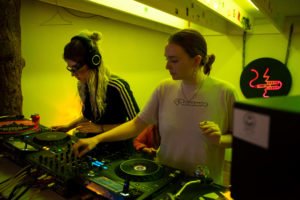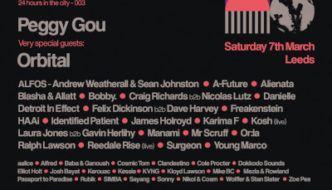
Abbie and Connor. Credit: Annie Feng, www.anniefengphotography.com
For anyone that has recently lived in Fallowfield, the student neighbourhood of south Manchester, the name and logo of Limbo Radio will be recognisable. On stickers in pub toilets and the Facebook feeds of DJ-ing friends, the cartoon cigarette-and-smile is ubiquitous in the area. But behind this branding campaign is a modest force of young people who just want to soundtrack their community in the fairest, most fun way possible.
Limbo Radio is an independent community radio station, specialising in offering slots to DJs wanting to practice and promote their mixing abilities. Started in 2016, Limbo spent three years broadcasting contributions from emerging talent out of the student home of the station’s founders. Last summer, they promoted themselves from a flat in Fallowfield to a studio above the nightclub Hidden in Downtex Mill. They invite me to their new home to share their story and show how they’re settling in.
“We thought of the idea to start a station a few years ago because we felt as though we were surrounded by incredibly talented artists in Manchester and there wasn’t one platform for them all to come together on,” says Chris, who founded the station along with friends Sam and Jamie.
The boys started the station whilst studying in Manchester, recording and broadcasting mixes from their flat. They developed a programme of guests, and for several hours a day the sound of student crate diggers would be live on Limbo’s website for anyone to enjoy.

Credit: Annie Feng, www.anniefengphotography.com
This novel platform drew in local DJs inspired by Manchester’s clubbing and house party scene, keen to be part of it themselves. Limbo was soon broadcasting 56 shows a month. They went on to rack up 1400 in total in the flat.
The flat became a key spot for after-parties as the Limbo family tightened. The logo was plastered on posters, stickers and Facebook posts repeatedly as word spread of this new opportunity for students to cut their chops DJ-ing.
“Having Jamie who was into design and Sam who was into branding made it really important at the start to try and have that reach, because we were the only people doing it,” explains Connor, who joined the project in 2017.
Branding has been a subtle part of their success. “Everyone wants their Limbo photo,” says Abbie, responsible for PR. “Everyone shares it.”
After a set, DJs would get their photo taken in front of the Limbo logo in the flat to accompany their mix. Participants would share this to their Facebook feed and they’d appear over and over again on student social media. With 50 new DJs a year sharing Limbo’s brand with friends and followers, it became an emblem for Fallowfield’s scene of aspiring selectors.

Credit: Annie Feng, www.anniefengphotography.com
After three years, the team decided not to renew the tenancy and looked for their own location – “Working and living in the same space takes its toll,” says Abbie. The loft of Hidden, one of Manchester’s most popular clubs, was the perfect space to continue the station. Chris and Connor spent the summer of 2019 and all their resources to turn the loft into a useable, accessible studio.
During our interview, the sound of rain hitting the roof above clashes with the house music coming from a show recording in the studio, combining to give a symbolic sense of what Manchester sounds like.
Their new space, designed to resemble their flat, maintains its easy-going atmosphere, but with an added glow up of cinema seats, DIY decorating, complimentary drinks, plants, painted walls and a view of Strangeways Prison. It’s a natural improvement that gives them the space they need without losing them their laidback identity to excessive professionalism.
Along with the step up to the studio, the Limbo team has expanded to include event organisers, photographers and twelve show producers regularly helping run things. Before the move, the team held a big call out for volunteers to join the project. They received over 200 emails.
“It was quite overwhelming and humbling to see that we had that reach, because it’s kind of difficult when you’re in it every day to know how many people it affects,” says Connor. “But when that happens, that’s when you know that what you’re doing is important.”

Credit: Annie Feng, www.anniefengphotography.com
They marked the move-in with a 48 hour relaunch party, then built upon their event hosting with ‘Live in the Loft’, which featured artistic displays of 3D design, upholstery and all sorts of disciplines.
As well as the 50 resident DJs and collectives they now host, a large portion of their sets are still allocated to first-timers and students seeking foundations for a DJ-ing career.
During my visit, a set from Hull-based group Codex transitions into a residency instalment from all-female collective BLOOM. Limbo and their associated collectives mingle with and mention one another, creating a support system that feels like extended family. Dance music magazine Resident Advisor recently published a podcast episode on Manchester’s clubs and DJs. Several guests gave Limbo a shout-out.
From their new home, Limbo have been able to extend their programming and scale up their capacity, but the team are keen to point out that growth has been a gradual, controlled gift.
“The natural progression that it’s gone through year on year, the amount of guests we have on, our programming, our international reach has slowly increased,” Connor explains. “It’s not had a spike or a peak and we want to continue it that way.”

Credit: Annie Feng, www.anniefengphotography.com
Limbo is a striking success story of grassroots activity. Driving this is a network of young people who don’t just want to see the project prevail, but see it as a space to air theirs and other people’s talents. The team list a mass of collaborators that have helped with things like lighting, design and promotion.
“All these collectives exist because it’s never just people on their own, there’s always people helping them out with design or something.” Limbo’s own community is made up of creatives actively adding their ideas to the project, representing all sorts of tastes, interests and expertise – as Connor explains, it’s “almost the opposite of a fan-base because they’re actually involved”.
Their home city has a big part to play in this. Manchester’s music scene has been lacking the sort of supportive platform in recent years that its talent deserves. Limbo has occupied a springboard slot for the ambitious DJs that infest the city and need to build experience. The number and quality of young artists in search of this platform is what necessitates Limbo and what drives them.
“Limbo’s growth is solely down to the great community here in Manchester and for the general consensus of everyone wanting the best for each other,” says Chris.
“Seeing people we’ve had on go on to do other things, that’s the inspiration that pushes us on,” says Connor. “When someone tells us they’ve been booked to play the White Hotel because they heard their mix on Limbo, that’s what makes it worth it.”

Credit: Annie Feng, www.anniefengphotography.com
With so much talent coming through the station, Limbo plays a role in shaping the city’s reputation. They owe a lot to Manchester, but the city’s scene owes a lot to them and their productivity.
“When you see a lot of music articles [about Manchester], all anybody talks about is the Hacienda and the glory days and it’s just so boring – if you ask us what artists are in Manchester we can reel off hundreds and hundreds,” argues Abbie. “There’s so much more than the Hacienda here.”
Having such influence over a city’s scene is no small task. I ask the team if they want to displace the assumption that the Hacienda, Acid House and the 90s are Manchester’s dance music legacy. Their response is typically ambitious.
“Not to displace it, just update it,” says Connor. “And carve our own name out in the legacy.”
What will success look like for Limbo? More of the same, organic increase of artists and audience numbers, with the high standards and community serving ethos they started with. It’s a goal they’ll reach through their hard work and their sheer love of the culture they exist in. As Connor puts it: “We want to continue to do what we do, do it really well and do it better every day. And take that step up year on year.”
You can listen to Limbo Radio live from 4-10pm every day. Despite current circumstances, they are continuing to broadcast using pre-records sent in from collaborators.
Limbo recently joined the ‘Save Our Scene’ campaign to financially support workers in Manchester and Salford affected by venue closures and event cancellations. Money raised from their Crowdfunder raffle will go towards helping staff from local independent venues in these challenging times.
Images were provided by Annie Feng. You can see more of her work on her website or Instagram.




Comments